Drupal is an open-source eCommerce framework known for its adaptability, global support, and large community-driven development. Founded in 2000 by university students, it powers millions of websites globally with over 45,000 developers contributing to its growth.
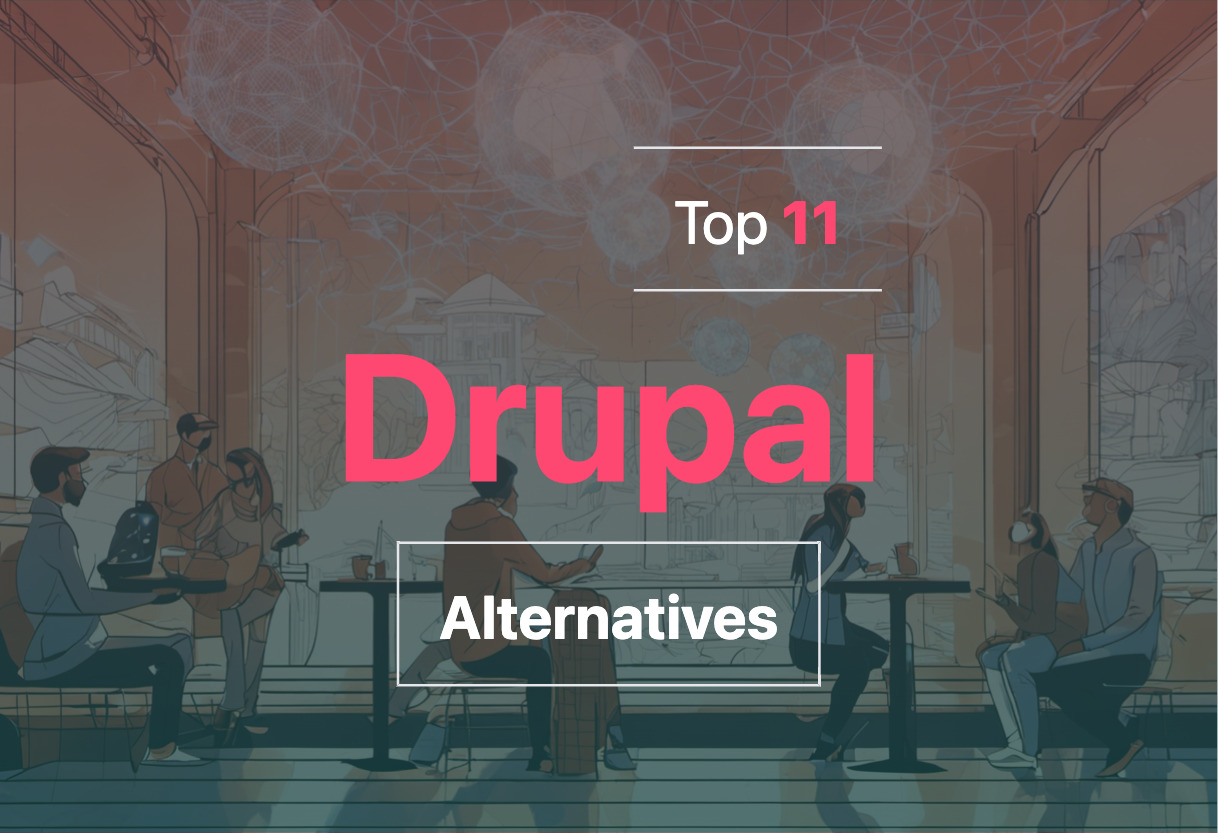
For those exploring alternatives to Drupal, options include WordPress, Joomla, Magento, WooCommerce, Shopify, Adobe Commerce, Squarespace, PrestaShop, OpenCart, Blogger, Laravel.
WordPress
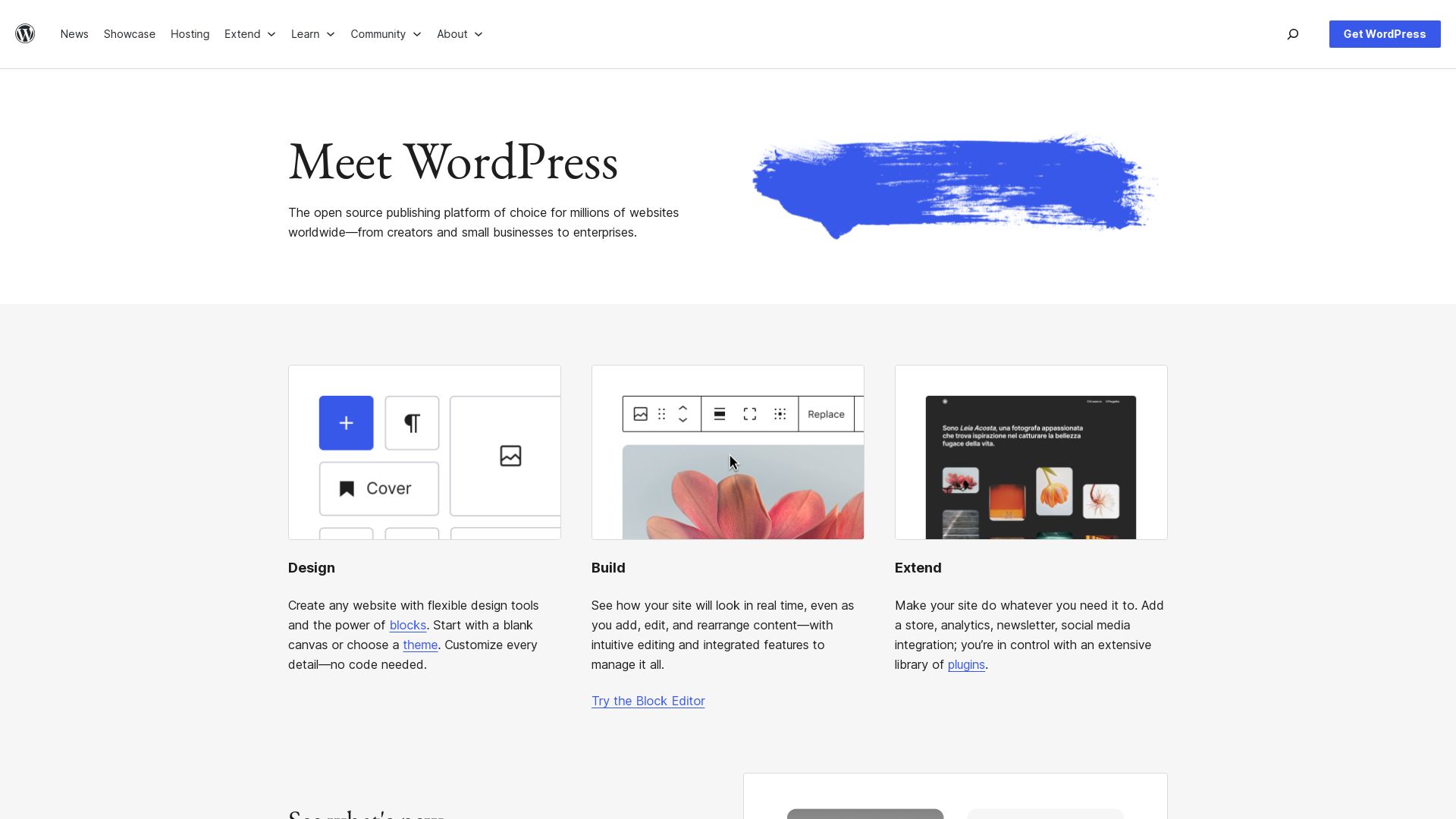
Step into the domain of WordPress, the titan that powers a formidable 40% of websites globally and claims a hefty 64% CMS market share. Yes, you heard right, 70% of websites on this big, blue ball we call Earth are driven by WordPress. But hold onto your chips, it’s not primarily an eCommerce CMS. Wondering how it fits into the eCommerce galaxy? Let’s get down and dirty!
WordPress Top Features
- Unparalleled versatility with over 1,200 eCommerce-focused themes for tailoring your site.
- Supercharge your eCommerce potential with WooCommerce; a free, open-source, and wildly customizable plugin.
- Integrated SEO artillery with Yoast SEO plugin to magnetize organic traffic.
- Automated updates and a dedicated staging site for risk-free, smooth product tweaking.
- On-the-go rollback tool to revert to previous post versions.
- Inventory management, real-time shipping rates, print labels, tracking codes under WooCommerce umbrella.
| Feature | Description |
|---|---|
| Automated Payments | Subscription setup with autopilot payments offering customers flexibility. |
| High-performance DNS | SSL-enhanced DNS for secure, speedy site experience. |
| Site stats | Instant access to site security and performance metrics for on-point management. |
WordPress Downsides
- Not primarily an eCommerce platform.
- Occasional plugin compatibility issues.
WordPress Pricing
Leveraging WordPress isn’t a free ride. While the domain registration and other essentials will set you back $15-$50 monthly, custom design can bleed anywhere between $1,000-$10,000. Got your sights on custom development? Prepare to shell out north of $25,000. Marketing services can vacuum out $250-$5000 per month, plus the cost of plugins and an average hosting fee of $20 per month. A transaction cut also goes to WooCommerce and PayPal for 2.9% + $0.30 per transaction. But hey, there’s some sugarless black coffee too – WordPress VIP, starts at $25,000 annually.
WordPress Use Cases
Use case 1
If you’re an eCommerce aspirant seeking airtight control over your digital canvas, WordPress offers unbeaten customization options. Crave a unique look, tailored functionality, or a SEO-friendly site? Brush off the constraints and let WordPress skyrocket your vision.
Use case 2
Are you a growing online retailer grappling with inventory management, real-time shipping rates, label printing, and tracking codes? Let WooCommerce under WordPress take the reins.
Use case 3
Bloggers or content creators looking for an ad-free browsing experience for their audience? WordPress, with its custom domain and high-performance DNS with SSL, produces a seamless, highly personalized reader experience.
Joomla
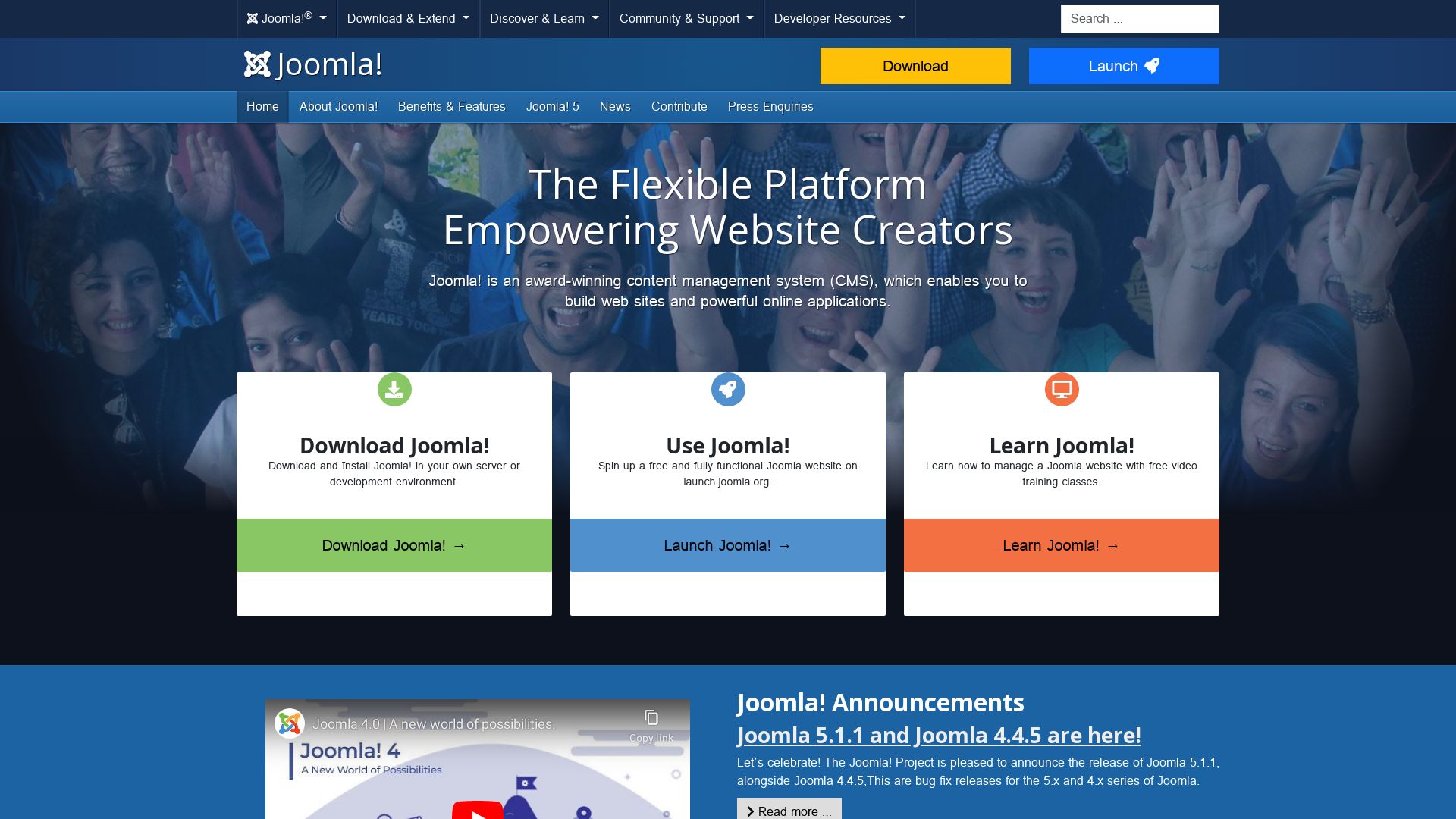
Step into the universe of Joomla, a potent, popular content management system (CMS) supreme in building dynamic websites and applications. Revered by web professionals since 2009, Joomla artfully daubs the canvas of the internet, from blogs to e-commerce stores.
Joomla Top Features
- Intuitive interface: Aesthetics meet functionality in its sophisticated platform for optimal utilization.
- Business and Marketing platform: A radiant beacon for online presence and marketing geared for businesses.
- Complete services: A holistic approach to design, development, and digital marketing services for Joomla platforms.
| Extendability: | With over 6000 extensions, Joomla is a chameleon adapting to your every whim and demand. |
| Latest Joomla version: | Meticulously crafted for peak performance, SEO practices, and impregnable security. |
| Page accessibility: | Strives for inclusion with adherence to W3C Accessibility guidelines. |
Joomla Limitations
- Lacks some specialized features present in competitors like Wix, Adobe Business Catalyst, and Agility.
- Although highly customizable, the availability of numerous plugins and extensions, can lead to a steep learning curve.
Joomla Pricing
A shining beacon for budget-conscious users, Joomla is free and open-source. It’s accessibility and democratic pricing open doors to individuals and businesses alike.
Joomla Use Cases
Use case 1 – E-commerce Stores
Joomla coalesces with ‘Hikashop’ for seamless product management, SEO optimization, and a plethora of shipping options transforming it into an e-commerce powerhouse.
Use case 2 – Web Content Publishing
Language internationalization infused within Joomla makes it a scalable choice for businesses or individuals in web content publishing.
Use Case 3 – Website Design and Development
Bestowed with a front controller and both frontend and backend interfaces, Joomla abounds in e-commerce themes like Splash, Yummy, and Trendz – all primed for SEO and ready for translation.
Laravel
Enter the realm of Laravel, a richly-featured PHP framework of choice for many eCommerce developers. With its high scalability, security, expressive syntax, and vibrant community support, Laravel serves both small-scale and large online businesses alike.
Laravel Top Features
- High Scalability: Laravel’s infrastructure caters to growing business needs ensuring smooth, scalable application development.
- Expressive Syntax: Enables writing simple, expressive code for efficient production.
- Strong Community Support: A reliable ecosystem with extensive community support.
- Managed Security: Laravel possesses robust security features to protect sensitive customer data. Support for end-to-end encryption and protection against common vulnerabilities is also present.
- Elegant Syntax & Developer-Friendly Tools: Laravel’s syntax and tools such as the Artisan command-line interface are designed with developers in mind.
| Feature | Description |
|---|---|
| Built-in Libraries & Pre-Made Packages | These aid the creation of comprehensive, modern eCommerce sites and contribute to Laravel’s high scalability. |
| Testing Mechanism | An elaborate mechanism for bug detection, such as PHPUnit, is provided. |
| MVC Architecture Support | Supports Model-View-Controller (MVC) architecture, promoting clean code and scalable applications. |
Laravel Limitations
- While Laravel is capable of handling large scale projects, proper planning and evaluation are vital to fully harness its capabilities.
- The learning curve can be steep for beginners due to Laravel’s extensive feature set and coding standards.
Laravel Use Cases
Use case 1: eCommerce Site Development
Laravel’s toolkit enables rapid eCommerce site development, reducing the need for redundant coding. It offers access to object-oriented programming (OOP) libraries, attractive pre-built themes, and the ability to create custom features and functionalities. This makes Laravel a suitable choice for businesses aiming to elevate their online presence.
Use case 2: Web and Mobile App Development
Amidst the rise of smart devices, Laravel is paving the path for seamless web and mobile app development. With its elegant syntax, vast ecosystem, and easy integration with user interfaces, Laravel efficiently supports the development of applications optimized for diverse platforms.
Use case 3: Custom Web Application Development
Seeking to build a unique web application? Laravel’s advanced features, coupled with handy tools like Artisan command-line interface and neatly bundled packages, make it a go-to option for custom web application development.
Magento
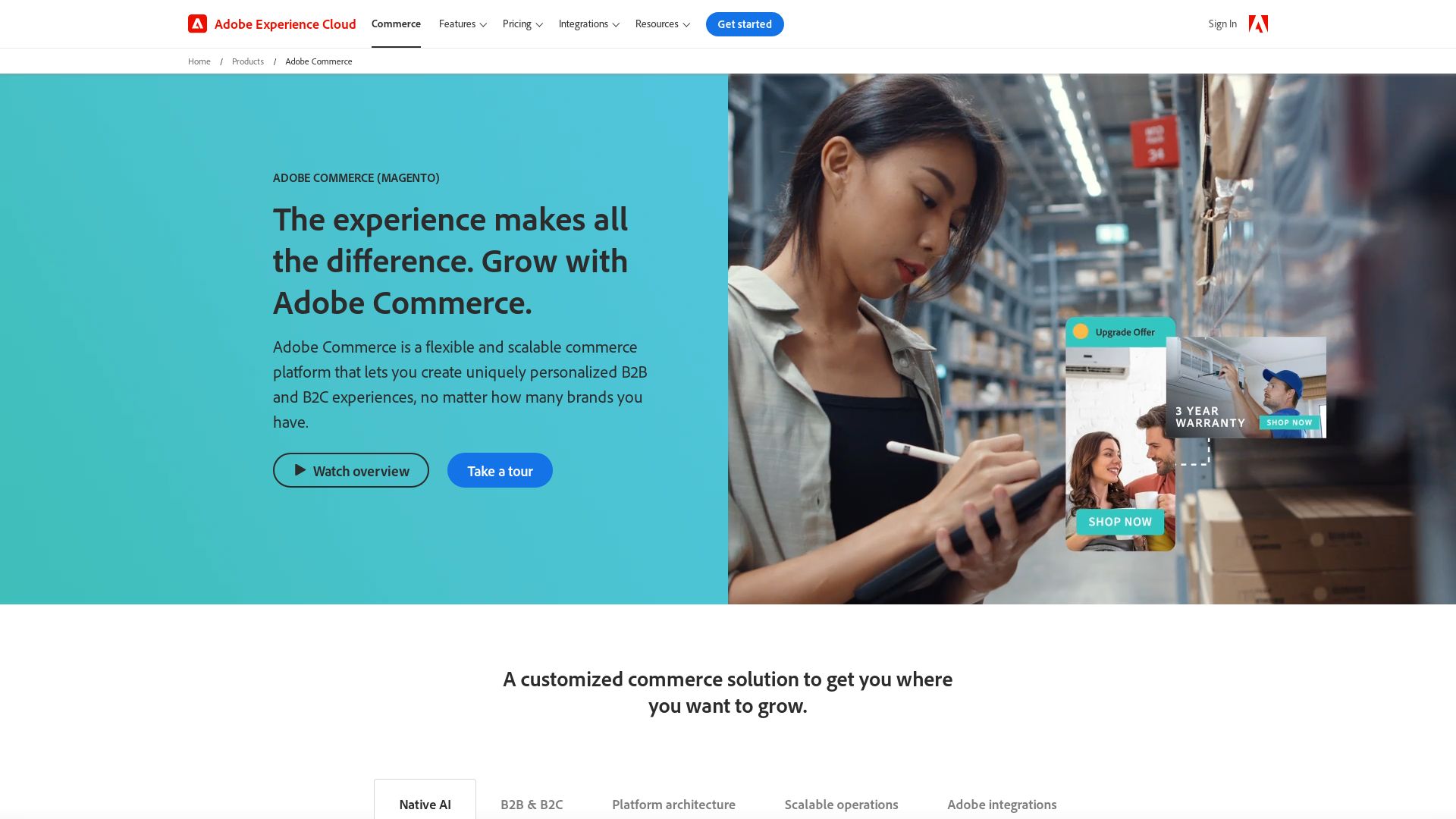
Introduced in 2008, Magento is an open-source platform employed worldwide by more than 250,000 ecommerce merchants, clutching 30% of the total market share.
Magento Top Features
- Three editions: Community, Commerce, and Commerce Cloud cater to different sorts of businesses. Open Source focuses on small to medium enterprises, while Commerce is versatile for larger product catalogs.
-
Advanced functionalities: Commerce Cloud offers advanced features, thus making it preferred by bigger enterprises.
- Robust Security: Magento’s Enterprise Edition includes impressive security measures, complying with PA-DSS, safeguarding sensitive customer data.
| SEO and digital promotion | $10,000 to $40,000/year |
| Community hosting cost | $100-$500/year |
| Extension cost | $60 to $600/extension |
| Technical Support | Included within Magento’s functionality |
Magento Downsides
- Magento carries high installation and development costs.
- Though Magento licenses are free, development and extension costs can be substantial, adding up rapidly.
- Magento requires informed investment understanding due to its complex cost structure.
Magento Pricing
Mentioned within the intricate cost structure is the charge for the Community edition from $12,000-57,000+, the Commerce edition from $22,000-$125,000 annually, and the additional annual fee for support and maintenance services starting at $22,250. Other costs include domain name, SSL certificate, extensions, development, payment provider fees, SEO, and digital promotion. The Cloud version costs $2,000/year excluding hosting.
Magento Use Cases
Use case 1 – Large Enterprises
Magento’s Commerce and Commerce Cloud editions revel in dealing with large product catalogs, thereby proving beneficial for larger clientele with advanced feature requirements.
Use case 2 – Medium to Small Enterprises
Magento Open Source edition, previously known as the Community edition, is potent for small to medium enterprises. It is cost-effective and delivers a powerful ecommerce solution.
Use case 3 – High Security Requirement
For businesses handling sensitive customer information that require robust security, the Magento Enterprise Edition, offering PA-DSS compliance, would be the superior pick.
WooCommerce
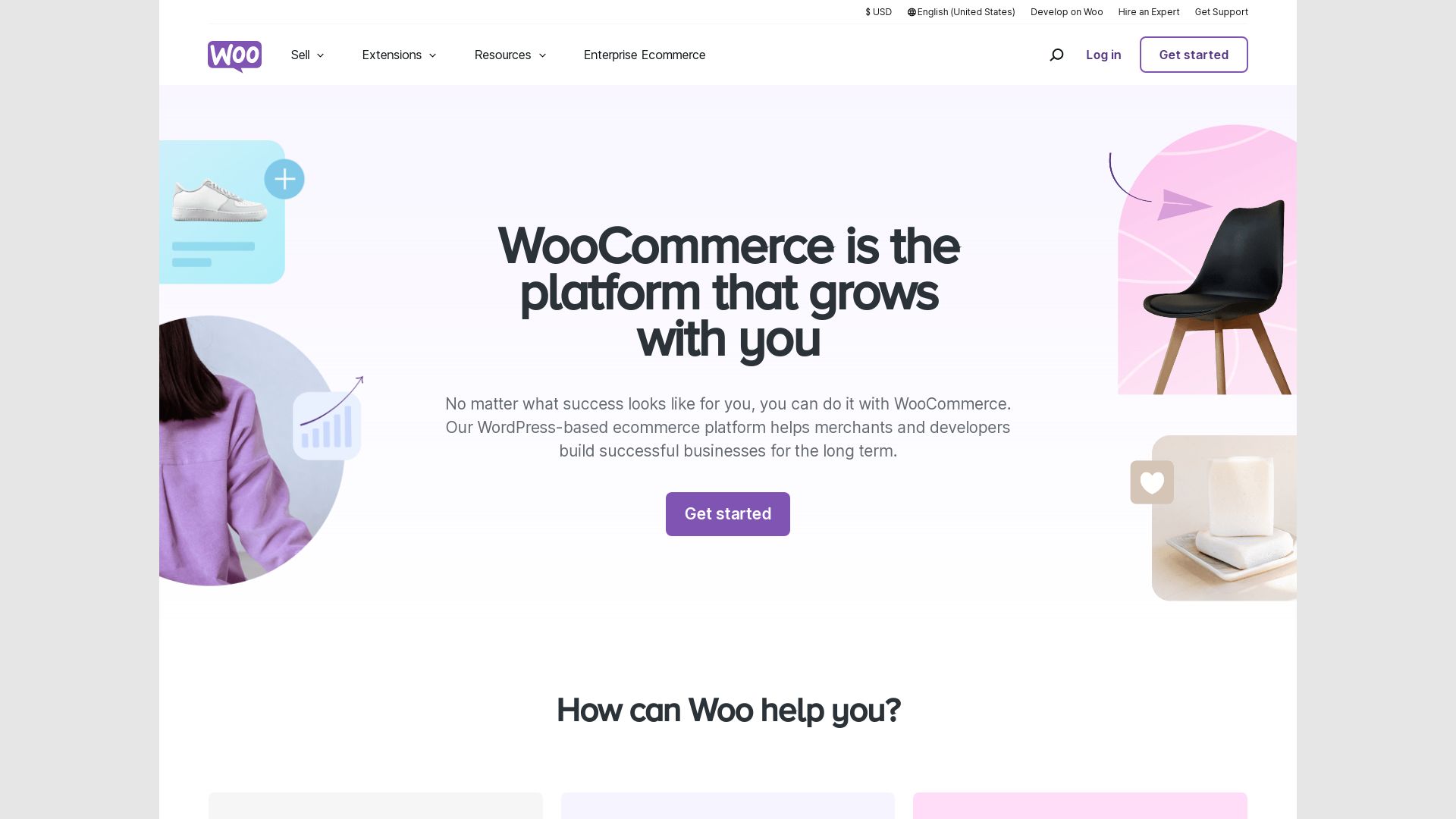
Open-source, robust and user-friendly, WooCommerce is an e-commerce dynamo built on the WordPress platform, showcasing a stellar record of 3.9M online stores and a 23% utilization rate on top ecommerce sites.
WooCommerce Top Features
- Customization options for store building, high-volume stores, and WooCommerce Express
- Integration with 140+ payment gateways
- Inventory & order management, tax rates, and coupon creation
- Conversion tracking, CMS, SEO, and social media integration
| Special features | Description |
|---|---|
| WordPress Compatibility | Limitation to WordPress websites, yet benefits existing site conversion into an online store |
| TheeDigital Association | Ensuring ecommerce success through strategic setup, customization, product additions, shipping setup, and extension addition |
WooCommerce Limitations
- Limited to WordPress websites only
- May require TheeDigital for an optimal setup and usage
WooCommerce Pricing
As an open-source platform, WooCommerce is readily available at no cost. However, advanced customization and enhancement may bear costs when using extensions and themes.
WooCommerce Use Cases
Use Case 1 – Small to Large Businesses
With its user-friendly interface and flexibility, WooCommerce is ideal for businesses of varied sizes. Aiding them in establishing aesthetically pleasing online stores with a seamless user experience.
Use Case 2 – Existing WordPress Sites
Factoring into its advantages is the ability of WooCommerce to convert existing WordPress sites into an efficacious online store.
Use Case 3 – High-Volume Stores
For enterprises with a high-volume of sales, WooCommerce offers the tailor-made capability for customization, catering to the scale and complex requirements.
Shopify
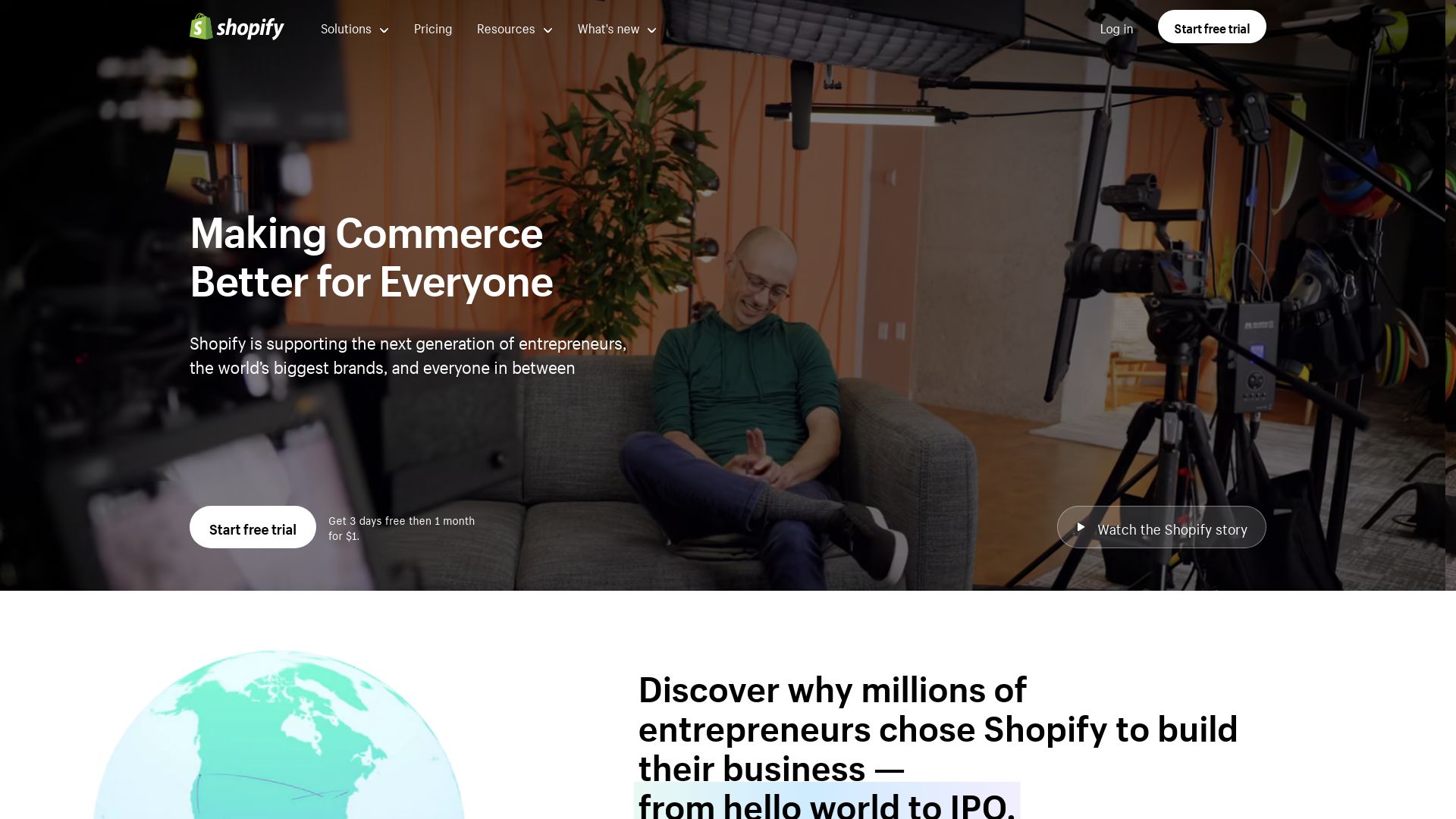
Looking for an eCommerce platform that offers pre-made, affordable templates with room for customization? Enter Shopify, a key player in the world of eCommerce that empowers you to craft your digital storefront with flexibility.
Top Shopify Features
- Assortment of templates: Shopify provides a slew of prefab templates allowing you to get started quickly.
- Customizable design:For those wanting unique aesthetics, Shopify themes support custom website designs.
- SEO Optimized: Drop that third-party SEO tool! Shopify has SEO built-in helping you rake in those organic sales.
| Search Functionality | Make your products easy to find for your customers. |
| Discount & Promotion Tools | Unleash enticing deals and watch your sales skyrocket. |
| Mega Menus | Clutter-free navigation? Surely a plus for user experience! |
Shopify Downsides
- While the templates are plentiful, brand-specific aesthetics are missing, necessitating custom website designs.
- To achieve a truly tailored design, you’ll need third-party help, increasing the cost.
- Separate page designs for product pages, blog pages, category pages add complexity if customization is key.
Shopify Pricing
A punch to the wallet or a ticket to prosperity? Shopify’s monthly subscription ranges from $29.99 to $299.99, depending on your needs. Remember, template costs, custom website design expenses, and additional functionality development costs ring the register too. Brace yourselves, classic web design can hit the $100,000+ mark. Ouch!
Shopify Use Cases
Online Stores
If you’re dreaming of an online store, Shopify’s affordable templates and SEO optimization is your launchpad. Turn visitors into customers with inclusive promotion and discount tools.
Custom eCommerce Experience
Yearning for a unique, brand-tailored digital shopfront? Shopify’s custom designing coupled with SEO optimization can help you create a standout eCommerce platform.
Quick Store Launch
If time is of essence, then ‘The Accelerator Programme by Eastside Co’ is your savior. Leverage their swift quick-launch solutions and launch your Shopify merch store in under four weeks. How’s that for speed?
Adobe Commerce
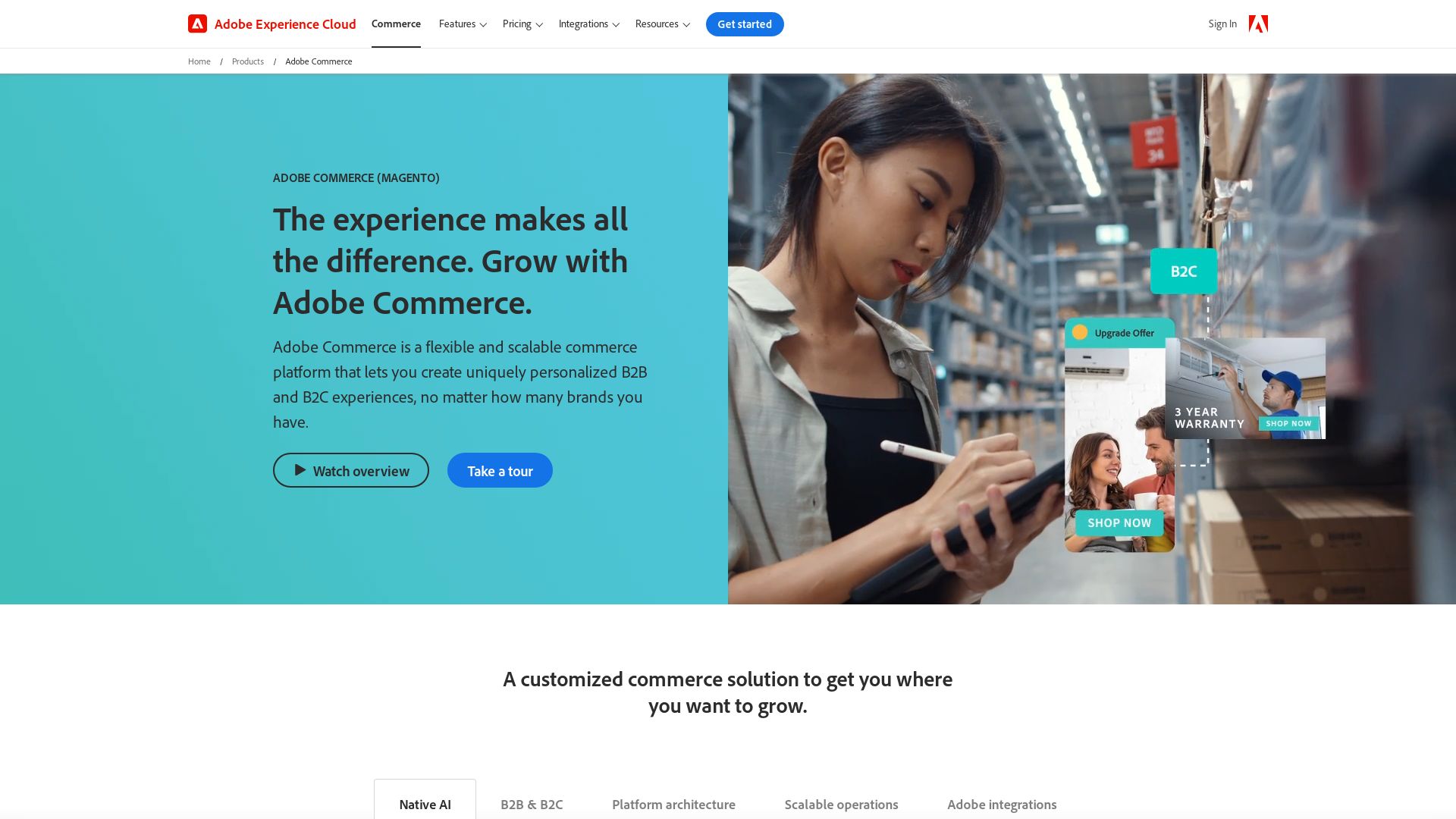
A fully-managed, cloud-based ecommerce platform, Adobe Commerce holds prominence in the Internet business arena. Originated from the acquisition of Magento Commerce, it’s powerful and flexible, powering major brands like Coca-Cola and Samsung.
Adobe Commerce Outstanding Features
- Responsive web design on multiple devices through Adobe Commerce Cloud.
- Use of technologies like cross-browser compatibility and Augmented Reality for engaging product catalogs.
- Detailed reporting functionality and a comprehensive suite of analytical tools.
- Adobe Experience Cloud tools integration, including Adobe Analytics Cloud, Adobe Marketing Cloud, Adobe Advertising Cloud, and Adobe Experience Manager.
- Customizable open-source system using Magento’s CPApabilities.
| Top Features | Description |
|---|---|
| “Differentiate through Development” approach | Cater to unique selling scenarios or handle complex UX requirements. |
| SEO best practices | Generates Google sitemaps and produces customized meta keyword descriptions. |
| Marketplace extensions | Available for separate purchase to amplify website functionality. |
Adobe Commerce Limitations
- High development cost due to extensive setup; an enterprise-level store build can rise to six figures.
- Licensing fees for Adobe software.
- Complex pricing model with increased costs for modifying the open-source Magento system.
Adobe Commerce Pricing
Adobe Commerce delivers as a cloud-based enterprise product with a comprehensive licensing fee. This fee encompasses all aspects of the platform, without any extra charges for transaction or credit card fees. A free Magento Open Source edition is available but includes additional costs for hosting and extensions.
Adobe Commerce Use Cases
Use case 1: Large Scale Businesses
Adobe Commerce caters well to large-scale businesses with complex ecommerce requirements. Be it robust reporting tools or powerful integrations, large companies find their needs met with Adobe.
Use case 2: Medium-sized Businesses
Medium-sized businesses looking for a comprehensive solution that integrates ecommerce with other marketing aspects, typically lean towards Adobe.
Use case 3: Smaller Businesses
Smaller businesses with limited funds opt for the free open-source edition, which might require additional costs for hosting and extensions, however still provides a scalable solution.
Squarespace
Unleashing a confluence of creativity and commerce is Squarespace, a sublime platform festooning a myriad of visually stunning templates for crafting remarkable websites and robust e-commerce platforms.
Squarespace Top Features
- Free website trials and expertly curated website templates: Squarespace offers a unique tapestry of aesthetic templates to choose from, inviting users to weave enchanting digital narratives.
- Ecommerce tools: Equipped to integrate both physical or digital commodities and services, Squarespace empowers unlimited product creation and management.
- Automated customer correspondence: Customizable email notifications keep customers coherent with your digital solstice.
- Analytics: Harnessing powerful tracking tools, Squarespace paints a vivid image of visitor behavior and sales patterns.
| Feature | Details |
|---|---|
| Squarespace Extensions (app store) | A limited collection of integrated applications to extend functionality. |
| Integrated with Square for offline selling | Amalgamate offline selling and inventory management with Square integration. |
| Membership, appointments, classes | Schedule appointments, sell classes, and gate community aspects with in-built tools. |
Squarespace Disadvantages
- Despite its evident allure, Squarespace houses a rather limited suite of applications via its Extensions.
- Moreover, the platform’s limitations surface in the absence of a transaction limit, potentially affecting larger online stores.
- Customer support, albeit esoteric, is only available through email, Twitter, and live chat.
Squarespace Pricing
Pricing specifics of Squarespace are dependent upon the chosen plan, offering services such as standard, commerce, and advanced commerce, each providing different features such as automatic discounts, subscription products, and localized shipping fees.
Squarespace Use Cases
Use case 1: Artistic Entrepreneurs
Bathed in an artistic aura, Squarespace provides artists and entrepreneurs, as though by magic, a digital canvas to sketch their ventures, spinning a web of aesthetic appeal and commercial success.
Use case 2: Ecommerce Startups
With Squarespace, eCommerce startups can create ethereal online stores, transmuting their vision into a thriving, tangible marketplace.
Use case 3: Bloggers
Squarespace also caters to budding bloggers, its simplistic yet sophisticated interface creating the perfect sundial to measure the passing of their intrigued audience.
PrestaShop
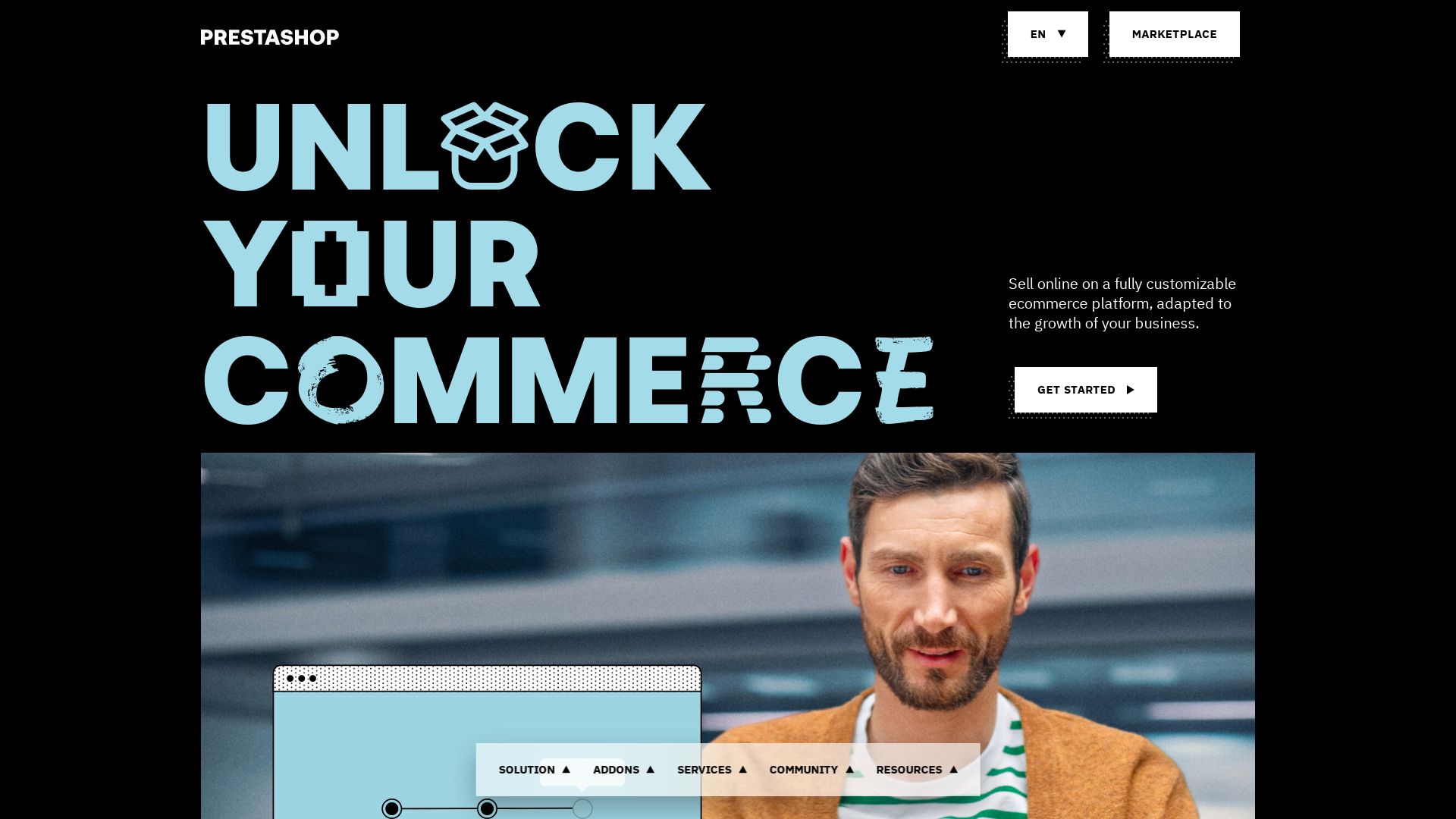
Established in 2005, PrestaShop is an open-source eCommerce solution committed to aiding merchants in their online business ventures. Its origin from the EPITECH IT School in Paris, coupled with its logical evolution over the years, underscores its commitment to robust, user-centric digital commerce.
Top PrestaShop Features
- Seamless Customization with a myriad of themes and modules available.
- Wide payment options and secure transactions safeguarded by SSL and HTTPS protocols.
- Exceptional SEO-friendliness and mobile responsiveness.
- Extensive Admin capabilities, including inventory management, advanced navigation, and search functionality.
| Feature | Benefit |
|---|---|
| Multi-store management | Efficient oversight of multiple online stores from one platform. |
| Translation into 75 languages | Breaks the language barrier facilitating international transactions. |
| PrestaShop’s Addons marketplace | Enhances store customization and functional capabilities. |
PrestaShop Limitations
- Additional costs might arise from acquiring and integrating some modules.
- Developer skills are imperative for advanced customization.
- Potential incompatibility issues when integrating some modules.
PrestaShop Pricing
Merchants may embrace PrestaShop’s offerings at no cost, given that it is an open-source platform. However, additional costs might emerge from acquiring particular modules to enhance functionalities.
PrestaShop Use Cases
Use case 1: Instagram utilization
Approximately 34.5% of PrestaShop stores leverage Instagram for digital marketing and customer engagement. Hence, businesses investing heavily in Instagram marketing will significantly benefit.
Use case 2: Facebook utilization
About 48% of PrestaShop stores enlist Facebook’s promotional potential. Businesses targeting a wide array of demographics stand to benefit significantly.
Use case 3: Global expansion
With PrestaShop supporting transactions in 75 languages, businesses aiming for a global footprint can easily scale internationally.
OpenCart
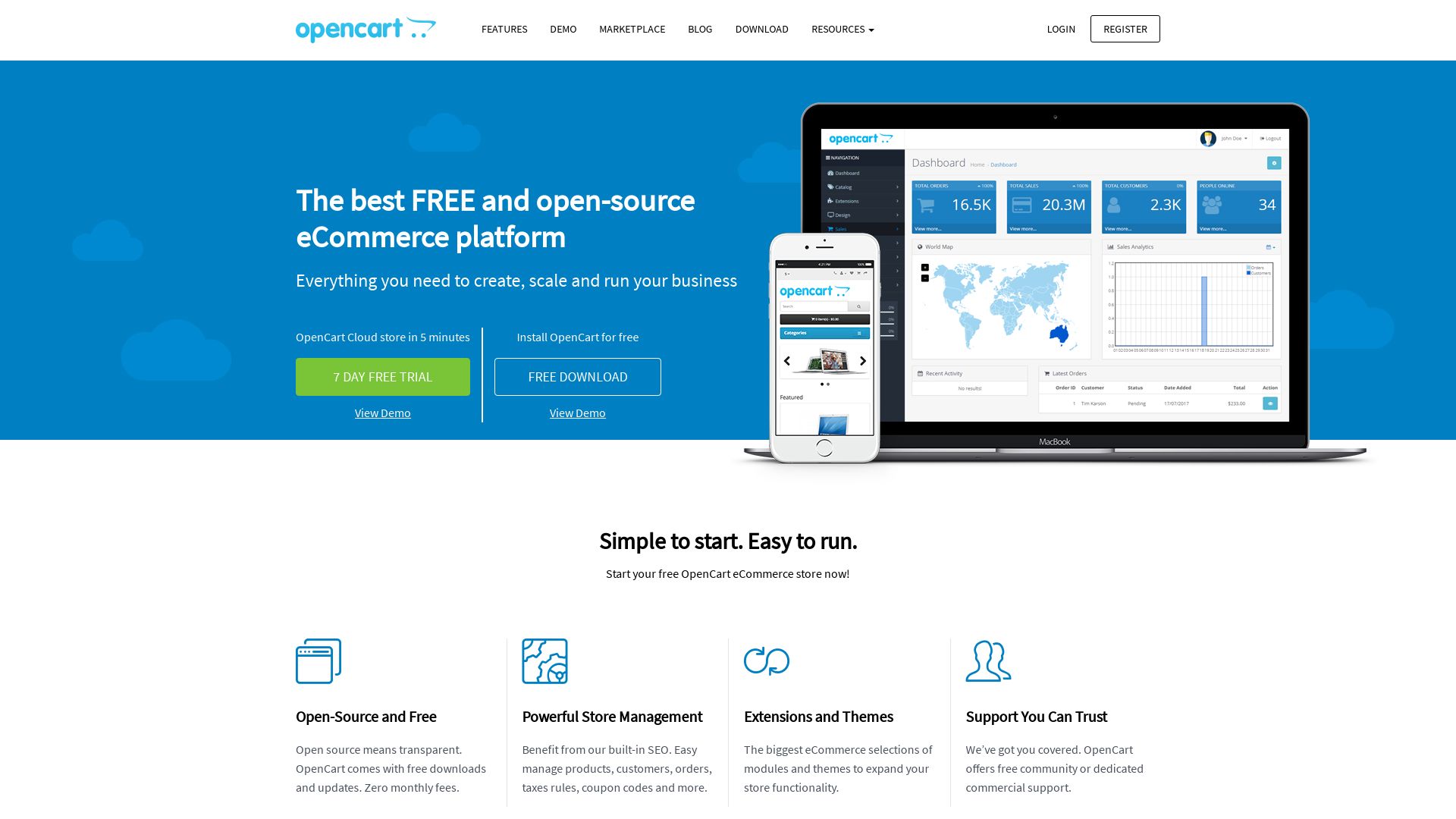
Giving your retail dreams digital wings, OpenCart is an open-source eCommerce platform that transforms your merchandise into an online extravaganza. All while making you feel like a tech ninja. After all, who needs Tony Stark when you have Daniel Kerr!
OpenCart Top Features
- Customization? Easy peasy! Modify source code to make your store as unique as you.
- An Admin Dashboard that feels like mission control for your eCommerce spaceship.
- Coupons, Discounts, and Specials to make sure your customers feel the love.
- An eCommerce lexicon boasting language and currency support to keep those international orders rolling.
- Packed with a bundle of tool, it’s like a Swiss army knife for eCommerce.
- SEO-friendly and mobile-responsive because we care about your Ranking and User Experience.
| Features | Details |
|---|---|
| User Roles | Customize user access because we believe in delegating. |
| Product Categories | Unlimited! Because being choosy is so old-school. |
| Payment Gateways | Adapts to hundreds of different payment gateways, just to keep your customers comfortable. |
OpenCart Downsides
- You need to know your tech. Optimization may require some technical wizardry.
- Sometimes, adding extra sparkle could cost you. Functionality can be a bit limited without extensions.
- Not the best choice if you’re dealing with a large-scale online store. Remember, it’s a chihuahua, not a St. Bernard!
OpenCart Pricing
With no single penny charged for usage, bugs would probably feel deprived of a job here! However, pay heed to the sneaky little costs for hosting, extension, and other features that might creep in.
OpenCart Use Cases
Use case 1
Starting a new online store? OpenCart is the wingman you need for easy setup, affordable costs, and attractive themes. Web novices, rejoice!
Use case 2
Managing multiple stores? Well, no sweat! OpenCart’s got it covered. Yes, it’s the Octopus of online trade.
Use case 3
If you’re a startup, why burn cash? Save time and costs with OpenCart, as long as PHP 5.2, Curl enabled, and a database are your pals.
Blogger

Blogger is an ecommerce powerhouse, known in the industry for its artful fusion of design excellence and user functionality. It’s popularity in the marketplace is driven by its commitment to a customer-centric design that prioritizes usability and fosters a highly engaging user experience.
Top Blogger Features
- User-centric design ensures easy usage and fosters customer retention
- A conversion rate 400% higher than its contemporaries, thanks to a pleasing user experience
- A smart search feature that facilitates quick findings ads to customer satisfaction
- Design incorporates brand identity, crucial for establishing business quality
| Emerging trends incorporated | Interactive layouts, dynamic pages, and data-driven product recommendations |
| Optimized mobile design | Ensures screen size adjustments and feature migration before launch |
| Enhanced security | Hosted check-out ensures a safe check-out process for customers |
Blogger Downsides
- May require a learning curve for those new to ecommerce design
- Focus on design may overshadow other business features
Blogger Use Cases
Use case 1
Blogger makes a great choice for businesses aiming to create a unique brand identity with its design-focused platform. With an ability to facilitate high conversion rates, businesses can also enjoy 400% higher conversion with a pleasant UX.
Use case 2
For digital enterprises looking to optimize mobile user experiences, Blogger lends itself well. Its mobile-centric design ensures a responsive display on various devices, impacting user retention positively.
Use case 3
Enterprises with a substantial inventory will appreciate Blogger’s smart search features and item filters. This boosts usability for customers and boosts overall customer satisfaction.
Logan Bellbrook
Content writer @ Aircada with a knack for nature & AR/VR/XR. Blogging the intersection of tech & terrain.





